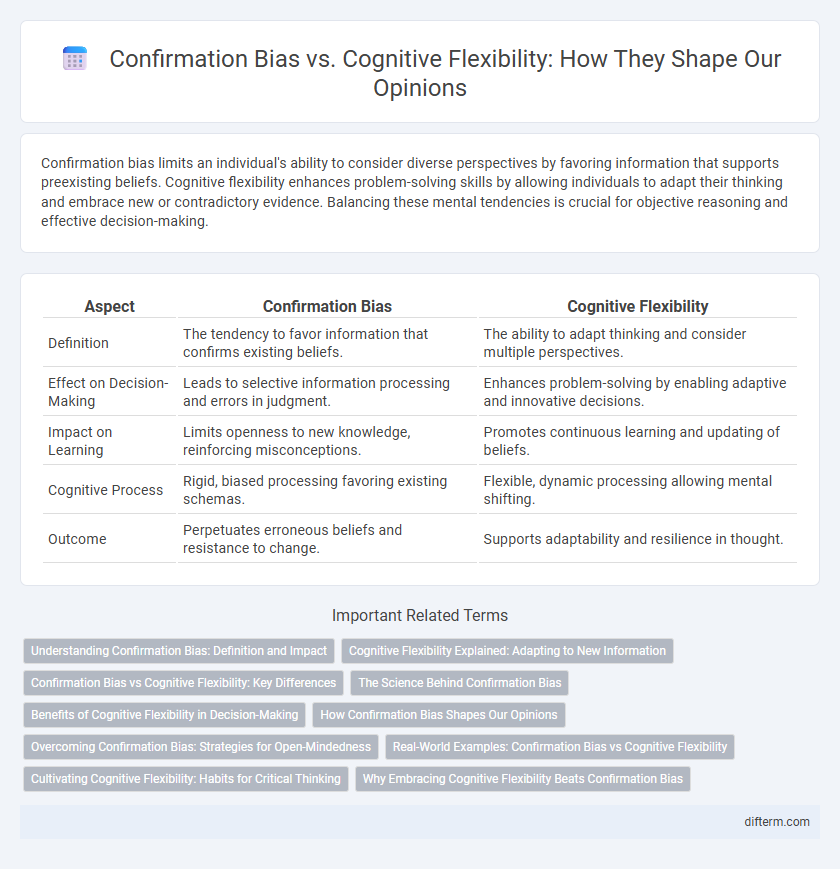Confirmation bias limits an individual's ability to consider diverse perspectives by favoring information that supports preexisting beliefs. Cognitive flexibility enhances problem-solving skills by allowing individuals to adapt their thinking and embrace new or contradictory evidence. Balancing these mental tendencies is crucial for objective reasoning and effective decision-making.
Table of Comparison
| Aspect | Confirmation Bias | Cognitive Flexibility |
|---|---|---|
| Definition | The tendency to favor information that confirms existing beliefs. | The ability to adapt thinking and consider multiple perspectives. |
| Effect on Decision-Making | Leads to selective information processing and errors in judgment. | Enhances problem-solving by enabling adaptive and innovative decisions. |
| Impact on Learning | Limits openness to new knowledge, reinforcing misconceptions. | Promotes continuous learning and updating of beliefs. |
| Cognitive Process | Rigid, biased processing favoring existing schemas. | Flexible, dynamic processing allowing mental shifting. |
| Outcome | Perpetuates erroneous beliefs and resistance to change. | Supports adaptability and resilience in thought. |
Understanding Confirmation Bias: Definition and Impact
Confirmation bias refers to the tendency to seek, interpret, and remember information that confirms preexisting beliefs while disregarding contradictory evidence. This cognitive distortion significantly hampers objective decision-making by reinforcing false assumptions and narrowing worldview scope. Understanding confirmation bias is crucial for fostering cognitive flexibility, enabling individuals to adapt perspectives and engage with diverse viewpoints effectively.
Cognitive Flexibility Explained: Adapting to New Information
Cognitive flexibility involves the ability to adapt one's thinking and behavior when confronted with new information, allowing for more accurate decision-making and problem-solving. Unlike confirmation bias, which limits understanding by favoring existing beliefs, cognitive flexibility promotes open-mindedness and the reassessment of evidence, enhancing learning and innovation. This mental adaptability is crucial in dynamic environments where quick shifts in perspective can lead to better outcomes.
Confirmation Bias vs Cognitive Flexibility: Key Differences
Confirmation bias involves favoring information that confirms preexisting beliefs, limiting open-minded analysis and reinforcing stereotypes. Cognitive flexibility enables individuals to adapt their thinking and incorporate diverse perspectives, promoting problem-solving and innovative decision-making. Understanding the key differences between confirmation bias and cognitive flexibility highlights the importance of challenging assumptions to enhance critical thinking and mental adaptability.
The Science Behind Confirmation Bias
Confirmation bias, a cognitive phenomenon studied extensively in psychology, involves favoring information that confirms existing beliefs while disregarding contradictory evidence. Neuroscientific research reveals that this bias activates reward-related brain areas, reinforcing preconceptions and limiting objective analysis. Understanding the neural mechanisms behind confirmation bias underscores the importance of fostering cognitive flexibility, which enables individuals to adapt their thinking and consider diverse perspectives for more accurate decision-making.
Benefits of Cognitive Flexibility in Decision-Making
Cognitive flexibility enhances decision-making by allowing individuals to adapt to new information and consider multiple perspectives, reducing errors caused by confirmation bias. This mental adaptability fosters problem-solving and creative thinking, enabling more accurate assessments of complex situations. Emphasizing cognitive flexibility leads to improved judgment and more balanced, evidence-based decisions.
How Confirmation Bias Shapes Our Opinions
Confirmation bias significantly influences opinion formation by causing individuals to selectively gather and interpret information that confirms their preexisting beliefs, leading to skewed perspectives and resistance to contradictory evidence. This bias limits cognitive flexibility, hindering open-mindedness and the ability to adapt opinions based on new, diverse information. Understanding the cognitive mechanisms behind confirmation bias is crucial for developing strategies to foster critical thinking and balanced decision-making.
Overcoming Confirmation Bias: Strategies for Open-Mindedness
Overcoming confirmation bias requires deliberate efforts to cultivate cognitive flexibility by actively seeking diverse perspectives and critically evaluating evidence that challenges existing beliefs. Employing strategies such as questioning assumptions, engaging in reflective thinking, and embracing uncertainty fosters open-mindedness and reduces the influence of biased information processing. Cognitive flexibility enhances decision-making by allowing individuals to adapt their views based on new data, ultimately promoting intellectual growth and more balanced judgments.
Real-World Examples: Confirmation Bias vs Cognitive Flexibility
Confirmation bias often leads investors to ignore contradictory financial data, resulting in poor stock market decisions, while cognitive flexibility allows traders to adapt strategies based on real-time market fluctuations and diverse perspectives. In political debates, confirmation bias reinforces polarized views by filtering information through existing beliefs, whereas cognitive flexibility promotes open dialogue and consideration of alternative policies. Real-world problem-solving in tech innovation benefits from cognitive flexibility by encouraging iterative testing and diverse input, contrasting with the stagnation caused by confirmation bias's preference for familiar solutions.
Cultivating Cognitive Flexibility: Habits for Critical Thinking
Cultivating cognitive flexibility enhances critical thinking by enabling individuals to adapt perspectives and evaluate evidence without bias, counteracting the limitations of confirmation bias. Developing habits such as questioning assumptions, exploring alternative viewpoints, and reflecting on one's reasoning fosters a dynamic mindset essential for effective problem-solving. Emphasizing cognitive flexibility supports better decision-making in complex, ambiguous situations characteristic of today's information landscape.
Why Embracing Cognitive Flexibility Beats Confirmation Bias
Embracing cognitive flexibility enhances problem-solving and decision-making by allowing individuals to adapt to new information and perspectives, whereas confirmation bias limits understanding by reinforcing pre-existing beliefs. Cognitive flexibility fosters open-mindedness and critical thinking, which are essential for innovation and personal growth. Overcoming confirmation bias helps avoid errors in judgment and promotes more accurate, balanced views in complex situations.
Confirmation bias vs Cognitive flexibility Infographic

 difterm.com
difterm.com